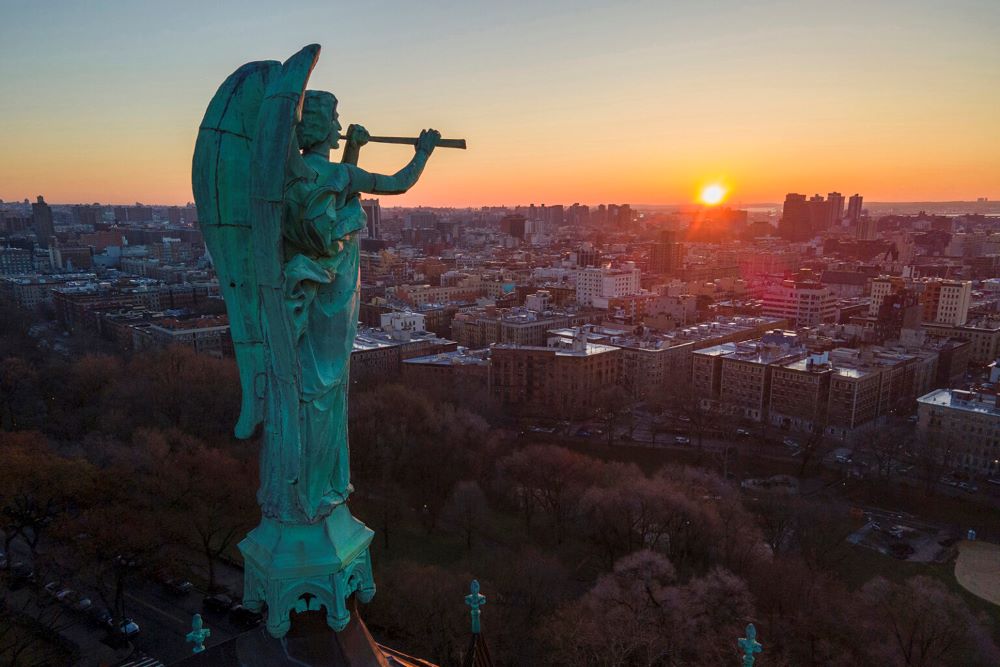
A bronze statue of the archangel Gabriel blowing a trumpet stands atop the Cathedral of St. John the Divine as the sun rises in the Morningside Heights neighborhood of the borough of Manhattan in New York March 26, 2023. (RNS/AP/Ted Shaffrey, File)
The Episcopal Diocese of New York will dedicate $1 million to racial reparations efforts within and outside the church, the diocese recently announced.
The fund, announced on Juneteenth (June 19), will be overseen by the diocese’s newly formed Moses Commission, which is set to begin its work in six months.
The aim of the commission, chaired by the Rev. Marisa Sifontes, associate rector at St. James’ Church in Manhattan, is to fund grants and loan forgiveness programs for congregations of color. The commission will also consider ways to make direct payments to descendants of slaves, inspired by projects advanced by other dioceses, Sifontes said, noting a Virginia Theological Seminary initiative.
Racial reparations emerged as a mission priority for the New York Diocese after it conducted listening sessions from January to April 2024 for its "Renewal of the church, healing of the world" campaign. The initiative aligns with the diocese’s spiritual mission of seeing Christ in each individual, said the Rt. Rev. Matthew Heyd, bishop of the Episcopal Diocese of New York.
"New York was the center of the slave trade in the United States," he said. "That evil is part of the fabric of the diocese, and we're trying to repair this fabric."
In recent years, campaigns for racial reparations have gained support among religious groups, including in denominations that historically profited from chattel slavery. Though approaches vary, some have presented racial reparations efforts as a religious duty.
In the Episcopal Diocese of New York, the fund is the latest effort toward racial justice. Years ago, it introduced a liturgy affirming Black Americans' suffering and publicly apologizing for its participation in slavery.
The new commission will take over work pioneered by the diocese's Reparations Committee to educate congregations on the diocese's racist history. Since its creation in 2006, following the 330th diocesan convention, the committee has inspired the diocese to apply a "reparations lens" to its social justice work, Heyd said.
"It’s not just the fund, but it's a whole constellation of ways in which we're understanding part of our spiritual formation as undoing racism and responding and dismantling white supremacy," Heyd said.
The committee documented how the diocese profited economically from the transatlantic slave trade and its racial discrimination practices during the Jim Crow era. It also produced a documentary aired in all congregations about the early church's rectors owning slaves, the establishment of separate chapels for African American congregants during Jim Crow, and the church obligating them to sit in the balconies rather than the pews. The committee also worked to highlight how these issues resulted in lasting privileges and disadvantages for certain congregations.
Advertisement
Recently, the committee prompted the diocese's trustees to adopt policies on diversity, equity and inclusion, and forgive property loans for congregations of color. Following its recommendations, the diocese's leadership agreed to forgive nearly $300,000 in loans used to cover building maintenance.
Over the next six months, a group of 12 clergy and lay people, selected by church leadership for their knowledge of racial justice efforts, will appoint commission members and establish a framework for its mission.
The fund will be replenished by 1% of the sale of all diocesan property, according to a diocesan press release.




